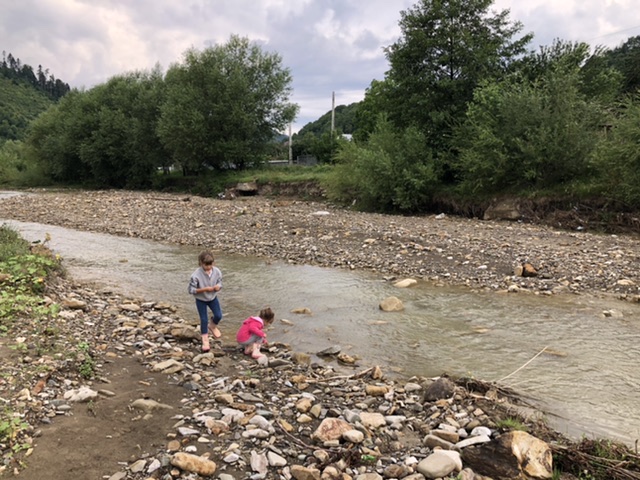I listened to pbcc conversation about race last week. Bernard bell, the resident scholar of everything historical, a researcher through and through, traveled, humble and so intelligent, he tackles this sensitive topic. Especially in today’s America.
At the end, the three people that shared their story, as part of the solution: which is listening, were asked what else could we do to honestly and effectively bridge the gap between races. A young man had one last suggestion that stuck with me. Initiate conversations.
So often we look (our mind races with thoughts) and we pass by, hardened further more by fear and unknown.
So we don’t have a race issue with people of color, not in the large cities filled with traveled people. Romanians are known for hospitality and an innate curiosity for other cultures. But I know how the racism can creep in. When people who are not like you move in next door and they inconvenience you just by being different, having different ideals or cultural practices.
Our biggest race problem as a nation is with Gypsies. And Romanians don’t like to be associated with them when traveling through Europe, though Gypsies have been mostly integrated and settled in Romania since they migrated in Europe.
We don’t truly know their history, their suffering and oppression, or their culture. We fear them. And we associate thievery with them, as the most common crime. But for the most part, we don’t understand them, and people fear that which they don’t understand.
I don’t have an approachable face. I make an effort to have an open stance, and smile. With time it becomes natural, but I have worked on it throughout my adolescence. I don’t care what people think of me, as in I don’t care to be liked. That makes people nervous. If I where to speak my mind freely, all the time, I’d be an uncomfortable company. Because I have very well defined thoughts. And opinions and standard. Lately, as I work hard to instill social skills and awareness in my kids, I’m easily annoyed when other kids cough on a spread of food all juicy and uncovered. Their parents don’t say a word. When should kids start covering their mouth when coughing? As early as one, when the parent gently covers their mouth and remind them “we cover our mouth when we cough”. Especially now, during the pandemic.
I feel saddened when I let judgmental thoughts peruse my mind. And I decided on two options: I let it go with a short prayer for patience and take my leave, or I kindly speak up. No matter how I say it, if it is to be effective, it will be uncomfortable. So I need to accept my causing discomfort.
But when it comes to race, because of my mom’s open attitude, I realize I’m curious and open. She has engaged often in conversation Gypsy ladies. Or it was the other way around but she didn’t shun them. She was always polite and responded. She seemed so brave to me. We didn’t discuss race, but my mom never talked bad about others, friends or foes.
So I still remember, a young woman, a gypsy lady and her child, traveling by train. She found my company safe, and we shared a train compartment. I smiled at her kid, and she shared with me her life. I was 17 years old. The ticket master passed by and asked if she was bothering me. I said not at all. A gypsy clan passed by, open our train compartment door, and asked her where was she from. She mentioned the city. They left her alone. The gypsy lady told me that there is rivalry between the big cities and they all know the clans and if she had said a different city they would have mistreated her.
What a way of life. I thought it was fascinating to listen to her. She thanked me for the company when she reached her destination, because she was with me she was left in peace for a little while.
Another girl, while I was waiting for my group Of friend, up in Vatra Dornei, I was 16 then, she came and asked if I know how to read. She said she got a letter from her sister who got married in a different city and she wanted to know what the letter said. I read it to her. She talked my ear off. But I was not afraid not put off. My spidy senses were at ease. I am inexplicably tense, aware, afraid, if I’m in dangerous situations. But these were just as they happened: people reaching out to people.
Another time, not long ago, I was in the Armatura Park, in the neighborhood with the largest gypsy community. It was just me and Jackie. And this large gypsy group. 5 kids all around the same age watched by to teenagers. All seemed related. The were polite, to me, to jackie, happy and respectful. More than I’ve encountered up in the upperclass parks where older kids would push younger kids off, not taking turns, talking loudly and disrespectful. It’s just a slight contrast of situations.
I know my easy frown and low voice have been useful in dangerous situations where I could easily send the message that you wouldn’t want to mess with me. I have had my fair share of those as well. Including with gypsy groups. I’m aware the reality is complex, and one needs to use a good amount of intuition, discernment of context, and not be foolish. My mind is already a few steps ahead, thinking of a way out in case of imminent danger.
But. Most often It’s up to us to make room for conversations, to allow connection. To permit engagent. We need to look the in the eyes and smile occasionally. To say hello. To smile at their kids. I find myself conversing with Gypsies in line at the grocery store in Iris, in the park, at the airport. So far it’s happened naturally. But after hearing the practical need to engage in conversation, it’s possible our empathy level will rise as we are open to see the world through their eyes.
A young family of 6 just moved in next door to my grandma’s house in the mountains. My uncle sold them his share, the garden with street front. This large family acquired land closer to the center of the village. A large lot. But the neighbors told him he is not welcomed among them. How sad is that. He is treading lightly, and he asked for my parents permission and opinion about building his house. This man, the head of his household is my age. Luckily, the neighbor on the other side is a kind, friendly older man. He even offered to help. Our new neighbor seems touched by the kindness of his new Romanian neighbors. My dad employed his eldest son to cut the grass. The teenage boy said the grass is payment enough because he gives it to his sheep and cow. But my dad insisted to pay him a little extra for his hard work. The boy was so excited and eager. When we visited the village this weekend he bought us fresh milk every morning.
Mixing in the neighborhood always for daily interactions. The preteen girl spent a few days with the woman next door, and asked her incessant questions about our ways. Why do you do this? Why do you do that? How things are done and when… she is a preteen with the curiosity of a 3 year old, who is fascinated with a different way of life: Folding, gathering, peeling, cleaning, washing, brushing, cutting, sorting, feeding… we grow up watching the adults around us, and we imitate. The effort these people put in to adapt is evident. And commendable.
—
Why is this conversation important to me? If you made it this far in this unexpectedly long post, you are privy to this piece of information. We didn’t make it a secret, and we actually discuss about race with our daughters, because they both have gypsy ancestors. I ought to educate myself about race. It’s a never ending journey of learning for which I am grateful.

